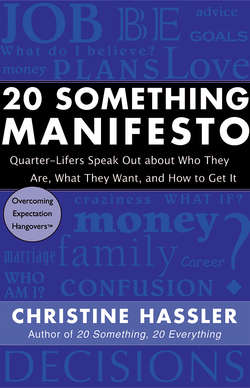Читать книгу 20 Something Manifesto - Christine Hassler - Страница 32
На сайте Литреса книга снята с продажи.
GOALS VERSUS EXPECTATIONS
ОглавлениеLet’s return to the twenty-something goals list that you created at the end of the “What’s Your Twenty?” exercise. What did you write down? Marriage, kids, a certain income, a profession? These are the things you want and plan to achieve in life. Your expectation is that as you succeed at certain goals, predictable results will follow that lead to everything you want. For example, graduating with honors from a good college leads to getting a good job, which leads to making more money, which leads to being able to support a family, which leads to having it all, which leads to happiness and success — or so we hope.
“It is harder for me to figure out what I really want in life because I feel so desensitized from the Hangover — from the results and goals that didn’t turn out how I expected.”
Business analyst, 29, on and off dating, New York
But what if we don’t get into that good college or make the grades we hoped, or we find that in real life our chosen profession is dull and boring — does that doom us to unhappiness and failure? Of course not. The first step in minimizing an Expectation Hangover is to distinguish a goal from an expectation. First, let’s turn to the dictionary. A goal is defined as “the end to which effort is directed,” while to expect is defined as “to anticipate or look forward to.” Notice that the definition of a goal involves action intended to achieve a tangible outcome. Whereas expectation is more of an emotion, one that waits to be fulfilled. Or, to put it another way, goals refer to things we can do, while expectations refer to what we desire or hope for. By working toward a goal, we engage in thoughtful, planned action, which often leads to success even if our ultimate goal (or desire) changes. However, to sit in expectation is to live inside our heads, waiting; we are stuck until our expectations are met, and when they aren’t, we feel more pressure and disappointment as time goes by. We identify goals whenever we say, “I want to,” while expectations are often prefaced by “I have to,” “I should,” or “I expect to.”
I find that twenty somethings are often not sure of what they really want, so they focus on what they believe is expected. Then they despair because these expectations, disguised as life goals and ambitions, seem so out of reach, so impossible. To move away from expectations, practice creating specific short-term goals. Keep in mind, even when our goals are reasonable, the devil’s in the details, in the steps to reach them.
“I am seeing that expecting too unrealistic goals and not being more specific or breaking big goals into smaller pieces in order to really conquer them contributed to the Hangover I experienced.”
Student, 20, engaged, Arkansas
CLARIFYING GOALS
A good way to create clarity between goals and expectations, and between lifelong ambitions and goals to focus on right now, is to write out a long list of everything you want to achieve without thinking about whether they are expectations or goals. Next, go through the list and circle anything that does not involve a specific, clear action step that you know how to realistically execute. For instance, “apply to law school” is a goal you have 100 percent control over reaching. “Get into law school” or “become a successful lawyer” are expectations. Similarly, “ask X for a date” or “put a profile on an internet dating site” are attainable goals right now. “Get married by twenty-eight” is an expectation. Anything you don’t circle can go on your short-term goals list.
Next, identify which of the items you circled on your list are expectations, and amend them into goals. Then, working backward, take any long-term life goals and create one action for each that you can accomplish and put it on your short-term goals list. For example, if you have an expectation to be wealthy, an attainable short-term goal you could create would be to open a savings account now. Remember, short-term goals can be very simple — there is nothing wrong with that. Creating an action plan of things you can do right now is empowering and gets you out of thinking in terms of expectations. In fact, setting attainable goals throughout your life will probably make you more successful, as they are self-driven and self-fulfilling. Stop playing the disempowering waiting game!
